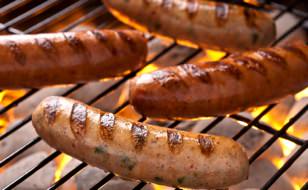BBQ Safety
BBQ Safety
 The weather is fairly unpredictable this summer, its hard to believe that we are into July and this is our summer time! The recent heavy downpours which have left parts of the country flooded, lead us to become extremely disconcerted with the Irish summer!
The weather is fairly unpredictable this summer, its hard to believe that we are into July and this is our summer time! The recent heavy downpours which have left parts of the country flooded, lead us to become extremely disconcerted with the Irish summer!
However, if you are lucky enough to grab a few rays of sun and decide to crack out the BBQ, have a look below at our tips on BBQ safety in the home. Accidents with the BBQ are more common than you may think!
Before you start
It's been a long miserable winter, so many of us would have packed up the BBQ, stored it in the garden shed or left it to get rusty out in the rain. Before you go throwing a new bottle of gas on to the connector, or a bag of coals into the barrel, make sure you give the BBQ a good clean. Not only is this the hygienic thing to do, but it ensures that any potential items of debris that may have fallen into the BBQ are removed so they don't set the entire thing on fire!
Check the BBQ over for any loose, or damaged parts. Cuts from sharp edges attribute to a large amount of BBQ related accidents each year. Ensure the legs and frame of the BBQ are stable and secure. If the legs have been rusted or wobbly over time, ensure you fix them or replace them as an unsteady BBQ is a dangerous BBQ.
Make sure the area that you wish to have the BBQ on, is a flat stable area. Concrete paths are best, away from trees, shrubs and sheds as these may catch light. A sheltered area away from wind is best as it reduces the risk of stray flames and flare ups from the wind. When choosing your BBQ's location, think carefully and imagine the worst fire possible that the BBQ can cause based on the location you are putting it. Is it a safe distance away from the house and trees? Is there a washing line with clothes on near enough that it could catch light? This may all seem like extreme measures, but when dealing fire, you have to be extra cautious as fire is the most destructible force in the universe!
Make sure you have a fire extinguisher close to hand; many people have one in the house anyway as a safety precaution or a fire blanket. You don't want to have to use it, but you never know! A gust of wind over an open flame can cause a lot of damage in a very quick space of time. Make sure you are familiar with how your BBQ works. This may sound like an obvious and un-necessary statement but read the instruction manual! Not all gas BBQ's operate the same, and gas shut off valves and connections can vary according to manufacturer.
The number one cause of BBQ fires is the fuel. Charcoal BBQ's are the cause of more accidents every year than gas, so ensuring you use the correct lighting fuel and procedures is a must. Lighting charcoal should never be turned into a game; it can be very dangerous and lead to sever accidents. The key is knowing how to safely light the coals. Only use enough coals to line the bottom of the BBQ barrel, (approximately 2 inches), and only use approved fire lighters on cold coals, never ever use petrol to light the BBQ!
If you are using a gas BBQ, make sure the gas cylinder is a safe distance away from the BBQ when being used so it is away from potential dripping grease and flames. If you suspect a leak in your cylinder or hose, lightly rub soapy water on the joints and look for bubbles. You can tighten up joints to fix the leak but do not over tighten.
Always keep children and pets well away from the BBQ.
Food
Now you are all set and safe, you are ready to cook! Bacteria are the most common cause of illness from BBQ food, and it spreads on every type of food. When cooking, ensure your food is cooked through and is not pink in the middle. Bacteria breeds at temperatures above freezing and is killed off once it reaches 175 degrees F (74 degrees C). Although your food may look cooked on the outside, be sure to check the centre of it for signs of uncooked meat. Chicken can often be the biggest culprit in the uncooked meat scenario attributing to more bouts of illness than most meats. We suggest popping the chicken in the oven for 20 minutes to start with while you cook your sausages and burgers on the BBQ. This will give the chicken a head start in becoming cooked through, and then finish it off on the BBQ.
When you are putting left over food away, it must be covered and make sure it has cooled through before putting it in the fridge. It is easier to get food poisoning than it is to catch the flu!
After the BBQ
BBQ's are a fun way to cook and a great social event in the warm summer evenings (if we get them), but even after the food has been cooked and you are ready to pack it all away again until the next time, it is still important to be vigilant and take care.
If you are using a gas BBQ, turn the gas outlet off first at the cylinder before switching off the controls on the BBQ. This will allow for excess gas in the hose to burn off on the BBQ and reduce the risk of gas escaping out when you disconnect the hose. For charcoal BBQ's, leave the coals to cool completely and never put hot or warm ashes in the bin or rubbish bag. For any type of BBQ, do not attempt to remove the grills until they have cooled to a safe temperature, the last thing you want after a successful BBQ is burnt hands!
One thing to remember with all this information that when you are dealing with fire of any type, it requires a clear and level head with a degree of concentration, so try and avoid consuming too much alcohol prior and during the BBQ. Once everything is put safely away, then you can sit back and relax with a cold beer!

